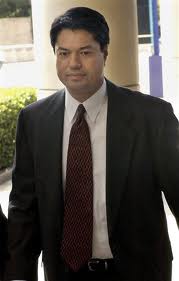 Flying a bit under the radar this past weekend was the dreaded "we’re sure as hell not coming back on Monday" verdict that the jury returned on Friday afternoon in the Refco, Inc-related criminal case against Mayer Brown partner, Joseph P. Collins.
Flying a bit under the radar this past weekend was the dreaded "we’re sure as hell not coming back on Monday" verdict that the jury returned on Friday afternoon in the Refco, Inc-related criminal case against Mayer Brown partner, Joseph P. Collins.
Collins was Refco’s outside corporate counsel for ten years or so before Refco disintegrated into bankruptcy in October, 2005. A New York city federal jury found Collins guilty on five of 14 criminal counts, including two counts of wire fraud, two counts of securities fraud and conspiracy, and a mistrial was declared on the other nine counts. Sentencing is scheduled for November 3rd. A previous post on the indictment is here and a copy of the original indictment against Collins is here and previous posts about the Refco case are here.
The jury verdict against Collins crosses the Rubicon in terms of the federal government’s willingness to prosecute an outside deal lawyer for merely advising a client in regard to structuring transactions that are not intrinsically illegal. As is typical of most business prosecutions over the past several years that criminalize questionable business judgment rather than clear white collar criminal acts such as embezzlement, the case against Collins was a jumble of conclusory allegations of fraud without any specific allegations of what Collins did that was criminal.
Heck, it was undisputed at trial that Collins barely worked on the transactions on which the prosecutors based their case against him. Essentially, the prosecution alleged that Collins assisted former Refco CEO and controlling shareholder Phillip Bennett in using Refco’s credit to reduce indebtedness to Refco of an affiliate controlled by Bennett. That’s not a crime, but the government asserted that Collins committed a crime by aiding Bennett in misleading Refco auditors and investors by not telling them about the use of Refco’s credit to reduce the affiliate’s debt to Refco.
It didn’t help Colling that a couple of other former Refco officers who copped pleas testified for the prosecution, although Bennett was not one of them. And the fact that a couple of partners from Weil Gotshal — which replaced Mayer Brown as Refco’s corporate counsel after Thomas H. Lee Partners bought a majority stake in the firm a few months before Refco’s public offering — also testified against Collins. I’d bet that testimony didn’t help relations between the two firms.
What’s curious about all of this is that numerous lawyers, accountants and investment bankers scrutinized and presumably profited from Refco over the past several years in connection with various investments in the firm, including its well-publicized public offering that valued the company at $4 billion five months before it disintegrated into bankruptcy. Not only did those professionals fail to uncover the alleged fraud, but none of them other than Collins was targeted as a criminal. See why these matters are better suited for civil cases in which responsibility for wrongdoing can be allocated among all the responsible parties?
Moreover, as this earlier post notes, if Collins knew about a massive fraud at Refco, then why on earth did he allow the company to be bought by Thomas H. Lee Partners and then go public where discovery of the fraud would likely lead to far more draconian consequences than if Refco had remained private?
Collins testified in his own defense and rightfully contended that it was never the job of Collins — or generally any outside corporate counsel, for that matter — to monitor the company’s transactions, which would be an impossible task for outside counsel. Collins went on to testify that was never informed of the hidden debt and that Refco’s top executives lied to him from the beginning.
At any rate, at the end of the trial, the prosecution contended that none of the specifics really meant much. Collins and Mayer Brown made millions off of Refco, which ultimately tanked. Thus, Collins must have done something wrong, right? Even this apparently divided jury agreed with that twisted logic.
Here’s hoping that the trial judge will set aside the verdict against Collins, but that’s probably wishful thinking in these anti-business times. The problem with this emerging governmental policy of prosecuting transactional lawyers is similar to the policy of criminalizing agency costs against corporate officers. There is a big difference between prosecuting agency costs and prosecuting clear-cut crimes, such as embezzlement. The difference relates primarily to the nature of the evidence involved, the relevance of contracts, and the subtleties of dividing responsibility between corporate actors.
Larry Ribstein has put it this way. Suppose somebody mugs you on the street. There is no question that is a crime. However, what if they ask you first if they can borrow your wallet, you loan it to them, and then they don’t give it back in time? What if they ask your employee who’s running the store for you whether they can borrow some money, the employee loans it to them and then they don’t pay it back? What if the "thief" is another employee who says the manager gave him the money as bonus compensation?
Who is liable in these situations turns on the contracts and the legal relationships among the various parties. Proof depends on who said what to whom. Can we rely on what the witnesses say about this? What if the prosecutor tells the guy who’s minding the store that he’ll not face a prosecution for conspiracy if he spills the beans on the employee?
In the meantime, the Collins verdict sends an ominous message to transactional lawyers everywhere. Rest assured that American business — and ultimately all of us — will endure the additional costs that deal lawyers will charge to endure the risk that the government will prosecute them for a crime that they do not know about.
Like this:
Like Loading...
 As Congress contemplates an historic extension of governmental control in regard to health care finance, a couple of stories relating to the growth of unrestrained exercise of governmental power in another area grabbed my attention.
As Congress contemplates an historic extension of governmental control in regard to health care finance, a couple of stories relating to the growth of unrestrained exercise of governmental power in another area grabbed my attention.








